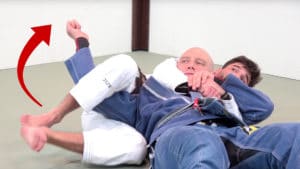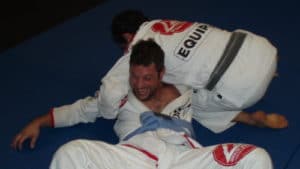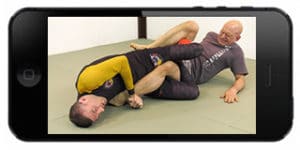The crucifix is a very important position in BJJ and No Gi grappling.
Like the rearmount the crucifix puts you behind your opponent where all your weapons are pointed at him and he’s essentially unable to launch any offense against you.
Unlike the rearmount, however, the crucifix ties up both of his arms so that defending your choke and armlock attacks becomes even harder for him.
So it’s a must-have for nailing submissions in grappling.
(It also has some deadly applications in MMA. Longtime MMA fans still talk about Gary Goodridge’s BRUTAL crucifix-with-elbows knockout of Paul Herrera at UFC 8, and it’s been used in the Octagon many times since.)

Gary Goodridge vs Paul Herrera, UFC 8
Detailed Crucifix Video Breakdown
Today we’re going to look at how to get into the crucifix position, how to maintain it, and how to submit your opponent even if he tries to escape.
Our guide to this attack will be BJJ black belt Thomas Lisboa, a very skilled competitor and teacher who trained extensively in this position with Marcelo Garcia.
Here’s a video I shot with Thomas’s on the topic, with further pictures and breakdowns below…
A Typical Rolling Crucifix Entry
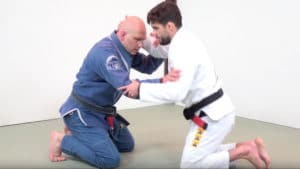
You can get into the crucifix a number of different ways, but the most common way is when your opponent is on his knees. In this example Thomas (white gi) and I (blue gi) start on our knees and he snaps me down (click here for a snapdown breakdown).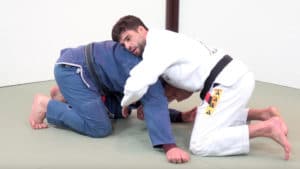
We end up in a front headlock situation with Thomas controlling my head and right arm with his own arms.
Often the guy on the bottom of turtle will try to complete the takedown and/or prevent his opponent from running around to his back. To do this he will often reach forward with one or both arms instead of keeping them tight.
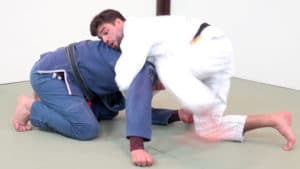
Thomas sees the extended arm and decides to take advantage. He lifts his left leg up and starts circling to his left.
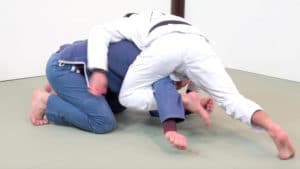
He continues moving around to my side and hooks my right arm with his left leg.
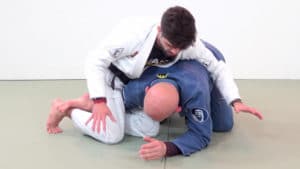
He is now off to my right side with my right arm trapped between his legs. His left instep is loosely triangled behind his right calf for added control.
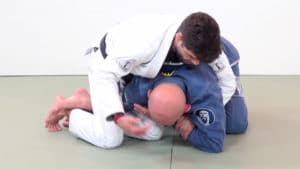
Thomas reaches and controls my left wrist with his left hand. This is often referred to as a ‘motorcycle grip’.
The combination of his legs trapping one arm and his hand immobilising the other arm means that he now has control over both sides of my upper body. As long as he keeps this control it will be very hard for his opponent (me) to defend submissions and escape the position.
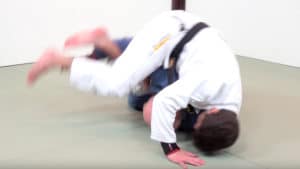
Oftentimes when an opponent is trapped in the crucifix he’ll initiate a roll to try and escape. Alternately sometimes the guy on top will jump over his turtled opponent to roll him over. The roll is not to feared and it opens up many new attacks.
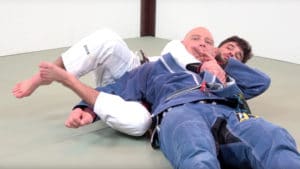
Thomas lands controlling both sides of my body, but his legs are still open which reduces his level of control…
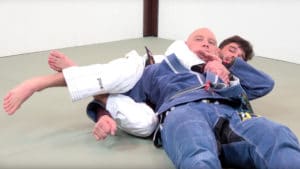
So he triangles his legs, bottom (left) instep behind his top (right) leg to tighten the arm control.
Note that he’s now switched to a ‘seatbelt’ control in which he links his hands around my head and left arm. This serves the same purpose as the earlier motorcycle grip in that it makes my turning towards his leg difficult, with the added threat that his right arm is now close to my neck and threatening the choke at all times.
Armbar with Bottom Leg Triangled

People caught in the crucifix will usually be very focussed on protecting their neck, so the first attack is this crucifix series is actually an armlock and not a choke. We start with one arm being controlled with triangled legs and the other side of the body being controlled by the seatbelt grip.
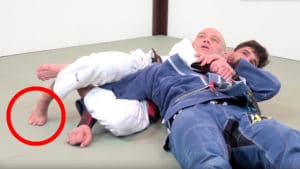
Thomas keep his legs triangled with his bottom (left) instep behind his top (right) leg. One thing that’s not so obvious in the picture above but that he emphasised in the video at the top of this article is that his instep is a down on his calf instead of exactly at the knee. This increases control over the arm since it’s further towards the end of the lever.
He then plants the ball of his top leg on the mat and moves his legs backwards, away from me, to take the slack out of my arm while still keeping his chest on my back.
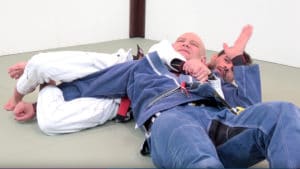
Once the tension is built up he bridges his hips forward while maintaining tight seatbelt control over my upper body. This extends my arm over the fulcrum of his hips and creates an armbar with his legs.
This may not look like an effective submission but I have both caught people in it, and been caught in it, many times. It’s definitely a high percentage submission that you should explore and then consider adding to your own arsenal.
First Escape and Armbar with Top Leg Triangled
Of course your opponent doesn’t want to give up the submission, so he’ll do his best to escape it. One very common reaction is for him to turn his arm up into a hitch-hiker position which relieves the initial pressure on his elbow.
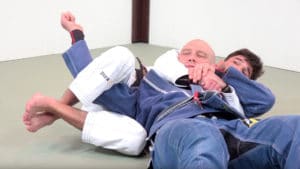
The key to countering this escape is to reverse your triangle.
In the first armbar-from-crucifix attack we covered the bottom leg went behind the top leg. But if your opponent has turned his arm up you need to do the opposite; your top leg now goes behind your bottom leg.
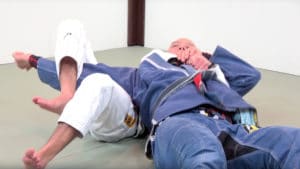
Keeping the seatbelt control tight on my upper body Thomas now starts to move his hips in, underneath me. He does this to line up his body up with my arm so that when he eventually applies the armlock then his hips will apply force directly into the back of my elbow joint.
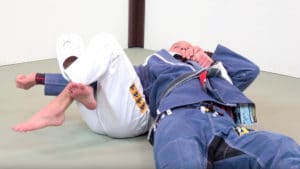
He now locks the triangle again in the middle of his calf. Note again that it’s with the top leg under the bottom leg.
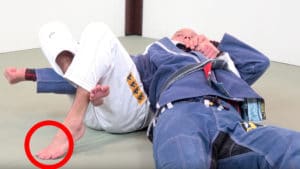
Thomas plants his foot on the ground for base so that he can generate more power.
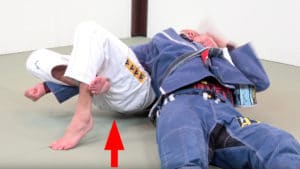
To finish this second armlock he lifts his hips UP while bringing his right knee DOWN. These two opposite motions, combined with the fact that I can’t move my upper body to relieve pressure, means that my right arm is now getting hyperextended and I have to tap.
Second Escape and Claw Choke
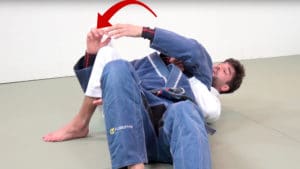
It’s very common for your opponent, sensing danger, to try and connect his hands.
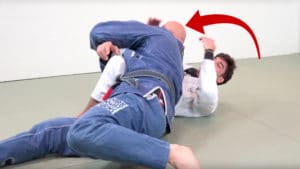
What you DON’T want him to do is to sit up and face your legs. But this can only happen if you release your motorcycle grip on his left arm; if you keep that grip then you can keep him in place.
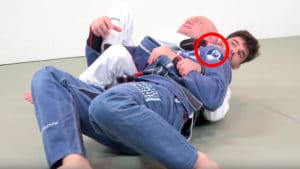
Thomas’s favorite choke in this situation is a one-handed ‘claw’ choke in which he grabs my left shoulder with his right hand and then pulls his wrist into my throat (while maintaining the grip on the wrist with the other hand).
He doesn’t like lapel-based chokes so much from this position because there is too much movement in the lapel.
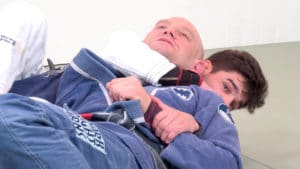 Closeup showing the wrist control, the claw grip on the shoulder, and the use of Thomas’s head pushing my head up and further tightening the choke.
Closeup showing the wrist control, the claw grip on the shoulder, and the use of Thomas’s head pushing my head up and further tightening the choke.
More Crucifix Resources
If you want to make the crucifix a part of your game then you should be prepared to go deep because there are many different entries, variations, and finishes to explore.
Let me give you some additional resources to help you become a black belt at this position.
First here’s a video I shot with Rob Biernacki (author of The BJJ Formula and The Modern Leglock Formula) with a variation of the crucifix in which you force him into an ‘arm down’ position and then tap him out with a Kimura-style armlock applied with your legs.
I’ve been playing with this variation myself recently and have found it very useful and powerful. Add it to your game if you can!
Secondly you should check out the article on Grapplearts called ‘A Confusion of Crucifixes.’
In grappling there is no grand unified governing body that regulates the naming of techniques.
So the name ‘crucifix’ gets used for more than one position.
This article breaks down the different (entirely legitimate) positions that are called by same name
More BJJ Resources
If you’d like some more help developing your gi and no gi games then here are a couple of other resources for you…
Grab my free Grapplearts BJJ Master App for iOS and Android devices that comes with more than 457 minutes of technique taught by BJJ black belts. Click here for more info.
The Modern Leglock Formula featuring Rob Biernacki and Stephan Kesting (that would be *ahem* yours truly) is your systematic and scientific guide to leglocks. It’ll add an entire new dimension to your grappling! Click here for more information.
Click here to download a free copy of my book, A Roadmap to BJJ, which will take you through the most important positions and transitions on the ground.
Good luck with your training
Stephan Kesting
Grapplearts.com
The post The BJJ Crucifix Position and Your Best Submission Options From There appeared first on Grapplearts.

